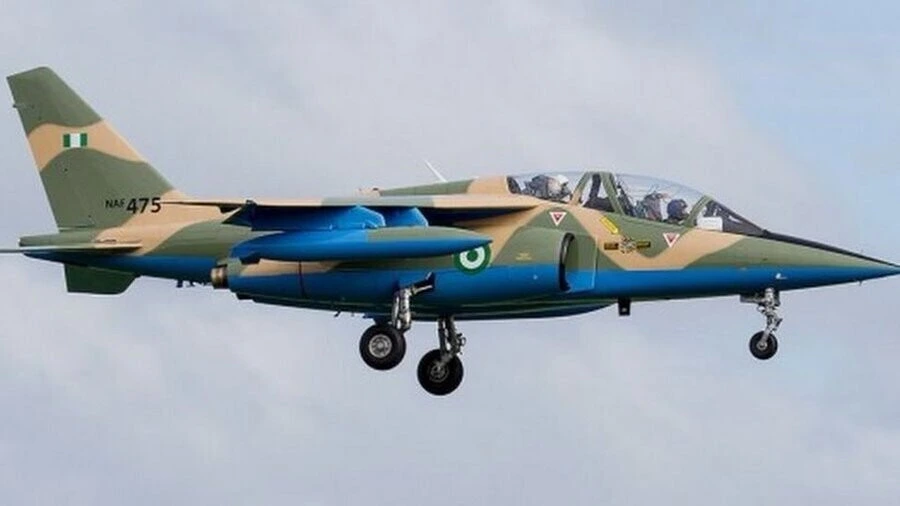2 June 2025, Zamfara, Nigeria – The Nigerian military has once again come under intense scrutiny following yet another deadly airstrike that killed at least 20 vigilantes and civilians in Zamfara State. This marks the third such incident in 2025 and the sixth in under a year, raising serious questions about whether these are genuine mistakes or a sign of gross incompetence within the armed forces.
On 1 June 2025, bandits attacked the Garin Mani community in Zamfara, kidnapping over 50 residents. Local vigilantes, known as the Zamfara Community Protection Guards, swiftly mobilised to track the bandits and rescue the abducted villagers. As they closed in on the criminals, a Nigerian Air Force fighter jet appeared overhead. Initially, the vigilantes believed the military had arrived to support their efforts. However, the jet circled back, descended, and opened fire, bombing the group. Survivors reported playing dead to avoid further attacks until the jet departed. According to SaharaReporters, approximately 20 vigilantes and civilians lost their lives. The community has since demanded that the Nigerian Army acknowledge the error, but the military has remained silent on the matter.
This latest incident is part of a troubling series of airstrikes that have claimed civilian lives across Nigeria’s northwest and central regions. Below is a chronology of the six reported mistaken bombings since April 2024, based on available reports:
April 2024, Zamfara: During Eid El Fitr prayers in Kukawa hamlet, Maradun Local Government Area, Nigerian military airstrikes killed over 40 residents. The attack was reportedly aimed at bandits but struck civilians gathered for the religious celebration.
September 2024, Kaduna: An airstrike targeting suspected bandits in Kaduna State resulted in the deaths of 21 civilians. The military claimed the strike was based on credible intelligence, but local reports indicated the victims were ordinary villagers.
25 December 2024, Sokoto: On Christmas Day, an airstrike in Sokoto State killed at least 10 civilians and displaced over 100 others. The Nigerian military stated that bandits were hiding among civilians, justifying the attack as based on “credible intelligence.” However, residents disputed this, asserting that the victims were unarmed civilians.
January 2025, Zamfara (Tungar Kara): An airstrike in Tungar Kara, Maradun Local Government Area, killed at least 16 civilians, including members of a local vigilante group. The Nigerian Air Force acknowledged the operation, stating it was investigating reports of civilian casualties but maintained that the strike had targeted bandits.
February 2025, Katsina: Another mistaken airstrike in Katsina State claimed civilian lives, though exact figures remain unconfirmed. This incident marked the second in 2025, intensifying public outrage.
1 June 2025, Zamfara (Garin Mani): The most recent attack, described above, saw 20 vigilantes and civilians killed as they pursued bandits. The military has yet to issue a statement, further fuelling public distrust. Nigeria’s northwest, including Zamfara, Kaduna, and Sokoto, has been plagued by armed banditry for years. These criminal gangs raid villages, kidnap residents for ransom, and burn homes, creating a climate of fear. The Nigerian military has increasingly relied on airstrikes to combat these groups, often citing the difficulty of distinguishing bandits from civilians in remote areas. However, the repeated targeting of vigilantes and civilians suggests significant flaws in intelligence-gathering and operational protocols.
In a 2023 report by ISS Africa, experts highlighted three critical factors to avoid such tragedies: human intelligence (information from local sources), signal intelligence (electronic data), and imagery intelligence (visual analysis of targets). The absence or misapplication of these appears to be a recurring issue. For instance, the 2017 Rann bombing in Borno State, which killed 112 people, was attributed to a lack of proper area marking. Similarly, the 2023 Tudun Biri bombing in Kaduna, which killed 120 civilians, exposed ongoing deficiencies in military precision.
The Nigerian public is increasingly sceptical that these incidents are mere mistakes. Social media platforms, particularly X, are abuzz with sentiments questioning the military’s competence and accountability. One user remarked, “It is safe to say that Air Force airstrikes have mistakenly killed more innocents than the actual criminals under Tinubu’s administration.” Others have pointed to systemic issues, such as inadequate training, poor coordination, and reliance on outdated intelligence.
The Nigerian Air Force’s responses often follow a familiar pattern: an initial claim of targeting bandits, followed by an investigation into civilian casualties. Yet, these investigations rarely lead to public accountability or policy changes. The military’s silence on the June 2025 Zamfara incident has only deepened distrust. Critics argue that the repeated claim of “credible intelligence” is a hollow excuse, pointing to a lack of ground-level coordination with local vigilantes who are often better informed about bandit movements.
Amnesty International and other human rights groups have condemned the military’s actions. In a statement following the January 2025 Zamfara bombing, Amnesty described the use of airstrikes as “reckless” and “unlawful,” accusing the military of showing a “shocking disregard” for civilian lives.
Several factors may contribute to this alarming trend:
The military’s reliance on unverified or outdated intelligence often leads to misidentification of targets. Vigilantes, who operate in similar terrains as bandits, are particularly vulnerable to being mistaken for hostiles.
There appears to be little communication between air forces and ground-based vigilantes or local security groups, resulting in friendly fire incidents.
Airstrikes are a blunt tool for combating banditry, especially in densely populated or mixed civilian-bandit areas. Ground operations, though riskier, may offer better precision.
Poor training, inadequate technology, and a lack of accountability within the military exacerbate these errors. The absence of transparent investigations further erodes public trust.
Nigerians are demanding urgent reforms to prevent further tragedies. Suggestions include:
Enhanced intelligence-sharing with local vigilantes to avoid misidentification.
Stricter protocols for airstrike approvals, including mandatory visual confirmation of targets.
Independent investigations into each incident, with findings made public.
Investment in ground-based operations and non-lethal methods to combat banditry.
The Nigerian government and military face mounting pressure to address these failures. With each incident, the narrative of “mistaken” bombings becomes less convincing, and the toll on civilian lives grows ever more unacceptable.
For now, the people of Zamfara, Kaduna, Sokoto, and beyond mourn their losses, while the question lingers: how many more “mistakes” can Nigeria afford?






